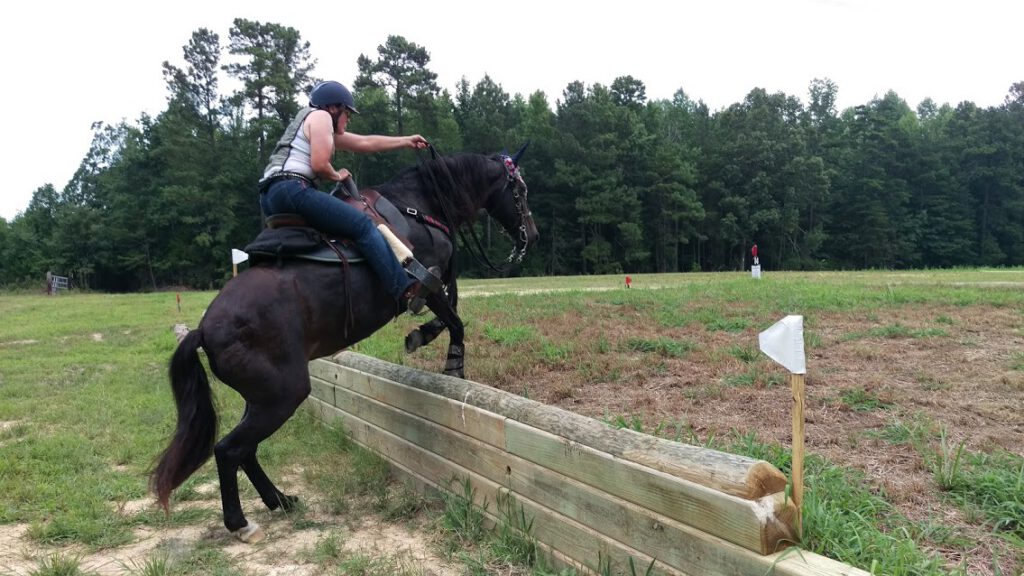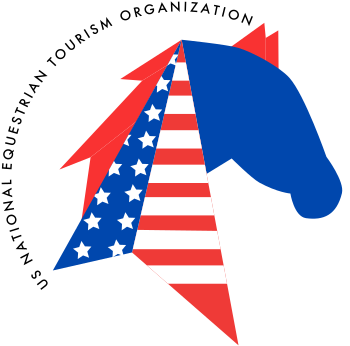
Ridden TREC Obstacle Phase
Technical Details for Ridden TREC Competitions
The Obstacle phase is designed to show the ability of horse and rider to handle situations that might be encountered riding while on the trail. Internationally, this phase is known as Parcours en Terrain Varie (PTV).
Course: 16 obstacles
Scoring: 0 to 160 for the course, 0 to 10 per obstacle
Distance: 1km to 5kms
Time: Times are set according to the obstacles, terrain, and level of competition
Format
The Obstacle phase is a timed exercise that has planned route disclosed before the start of the phase. Obstacles are marked with red (o right) and white (on left) flags. The start and finish lines are also marked with red and with flags. Riders are allowed to walk the course without their mount at permitted times. Any obstacles may be by-passed without elimination with permission from the obstacles’ judge while riding the course.
Objectives
To perform all the obstacles in sequence within the time period allowed.
Levels
| Level | I | II | III | IV |
| Jump Maximum* | 2’-0” (.609m) | 2’- 6” (.762m) | 3’-0” (.914m) | 3’-3” (1.07m) |
| Jump Minimum | 1′ – 0” | 2’-0” | 2’-6” | 3′-0” |
| Course Design | Inviting Easy distances and routes | ModerateSlightly challenging routes and distance | ChallengingObstacles combinedRoutes tighten | DifficultCombinationsChallenging routes |
| Time Allowed: | Ample | Reasonable | A Consideration | A Factor |
Maximum jump sizes are typically reserved for championship competitions
Specific Rules
- Correct dress is required
- Helmets are required while mounted
- Body protectors are required at level IV and encourage at all levels
Scoring
TREC obstacles are scored based on 3 factors:
- Effectiveness
- Obstacle Type (Gait, Style, or Timed)
- Penalties
Effectiveness
The effectiveness score is about how efficiently the obstacle was completed. A well-balanced, quietly performed execution of the obstacle will score the highest points. Faults can be incurred during the approach to the obstacles and while performing through the obstacle.
The Descriptions and Scoresheets have the details for each Obstacle.
Obstacles Type
There are three types of TREC obstacles – Gait, Style and Timed.
Gait Obstacles
Gait obstacles reward faster consistent speeds and include:
- Corridor, Ridden and In-Hand
- Low Branches
- One Handed Figure 8
- Slalom
Points vary according to the level of competition. Breaks in the gait while performing the obstacles are scored according to the slowest gait performed.
Style Obstacles
Style Obstacles reward horse/rider teams that execute ideal performances. Style obstacles include:
- Bank Down, Ridden and In-Hand
- Bank Up, Ridden and In-Hand
- Dip
- Ditch, Ridden and In-Hand
- Footbridge, Ridden and In-Hand
- Gate
- Hedge
- Incline Down, Ridden and In-Hand
- Incline Up, Ridden and In-Hand
- Log, Ridden and In-Hand
- Mound
- Path crossing
- Rein-Back, Ridden and In-Hand
- S-Bend, Ridden and In-Hand
- Staircase Down, Ridden and In-Hand
- Staircase Up, Ridden and In-Hand
- Water Crossing
Points accumulate according to the ‘ideal”.
Timed Obstacles
Timed Obstacles reward proper execution within a time frame. Timed obstacles include:
The Descriptions and Scoresheets have the details for all Obstacles.
Penalties
Penalties are consistent deductions with all the obstacles to encourage good horsemanship.
The Descriptions and Scoresheets have the details for each Obstacle.
